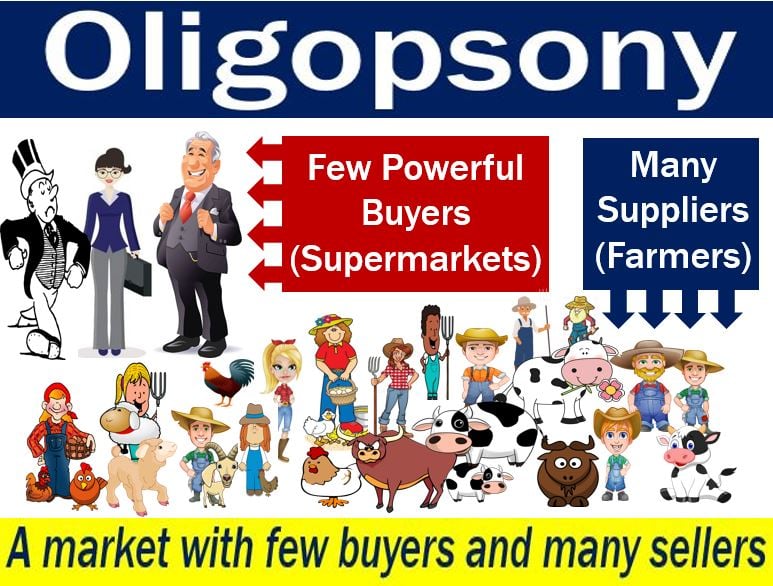Oligopsony – definition and meaning
An oligopsony is a market in which there are few buyers but many suppliers. This makes it a buyer’s market. In an oligopsony, the few buyers are usually large and powerful. Consequently, the buyers exert a considerable influence over the sellers. In fact, in some cases, if they drive down prices, the suppliers have no choice but to comply.
An oligopsony contrasts with an oligopoly, which is a market with few suppliers and lots of buyers. In an oligopoly, the suppliers control the market, and ultimately, prices.
An oligopsony is a form of imperfect competition. Oligopolies, monopolies, and duopolies are also forms of imperfect competition.
A monopoly is a market in which there is just one seller. A market with just two sellers is a duopoly.
Fast-food industry – an oligopsony
In the fast-food industry, for example, there are a few giant buyers. Burger King, McDonald, Wendy’s, and a couple of others in the United States control the meat market.
The fast-food giants dictate terms when negotiating with their suppliers, i.e., farmers. They even influence labor standards and animal welfare conditions.

Oligopsony – retail grocery
Since the late 1980s, supermarkets in the advanced economies globally have acquired a growing share of the grocery market.
As their market share has grown, so has their influence over suppliers.
Consequently, today, giant supermarket chains dictate what food farmers grow. They also dictate terms with food processing and packaging companies.
In fact, supermarkets impact the lives and incomes of hundreds of millions of people globally.
Additionally, the consolidation of retailers means that they can exercise considerable market power. In some parts of the world, this has led to allegations of illegal and unethical conduct and abuse.
Cocoa and tobacco – few buyers
Cocoa is another example of an oligopsony. Just three companies buy most of the cocoa beans that farmers grow globally. These companies are Barry Callebaut, Archer Daniels Midland, and Cargill.
Most of the cocoa growers are farmers in the third world.
Altria, Lorillard Tobacco, and Brown & Williamson buy nearly 90% of the tobacco that US farmers grow.
According to ft.com/lexicon, an oligopsony exists when:
“When demand for a particular product is dominated by a few buyers, which are therefore able to control prices and output – though they would normally have to take each other’s decisions into account.”
Oligopsony sectors
Here are some sectors with relatively few buyers but many suppliers, i.e., oligopsonies:
Agricultural products procurement
- Main buyers: Large food processing companies and retailers.
- Suppliers: Small to medium-sized farms.
Retail food processing
- Main buyers: Large supermarket chains and food distributors.
- Suppliers: Agricultural producers and farmers.
Raw material procurement in manufacturing industries
- Main buyers: Large manufacturing corporations.
- Suppliers: Various raw material producers and extractive industries.
Pharmaceutical industry (for raw materials)
- Main buyers: Large pharmaceutical companies.
- Suppliers: Specialized chemical manufacturers.
Labor market for highly specialized professionals
- Main buyers: Large corporations and specialized firms.
- Suppliers: Skilled professionals with niche expertise.
Commercial real estate development
- Main buyers: Real estate development firms and investors.
- Suppliers: Landowners and construction companies.
Automobile manufacturing (for specific components)
- Main buyers: Large automotive manufacturers.
- Suppliers: Specialized parts manufacturers and raw material producers.
Technology hardware production (for rare minerals)
- Main buyers: Technology companies.
- Suppliers: Specialized mineral extractors and refiners.
Meat processing and packing
- Main buyers: Large meat processing companies.
- Suppliers: Livestock farmers and ranchers.
Energy market (for certain raw materials like natural gas or oil)
- Main buyers: Energy corporations and distributors.
- Suppliers: Oil and gas drilling companies and extractive industries.
Textile and apparel manufacturing (for specific fabrics)
- Main buyers: Textile and apparel manufacturers.
- Suppliers: Specialized fabric producers and raw material suppliers.
Publishing industry (for authors’ works)
- Main buyers: Publishing houses and media companies.
- Suppliers: Authors and literary agents.
Raw materials for the construction industry
- Main buyers: Construction companies and contractors.
- Suppliers: Raw material producers such as cement and steel manufacturers.
Global shipping and logistics
- Main buyers: Large shipping companies and logistics providers.
- Suppliers: Manufacturers and exporters.
Industrial machinery manufacturing (for specialized parts)
- Main buyers: Industrial machinery manufacturers.
- Suppliers: Specialized parts manufacturers and raw material producers.
Video – What is an Oligopsony?
This video, from Marketing Business Network, our sister channel in YouTube, explains what oligopsony is using easy-to-use language and examples.

